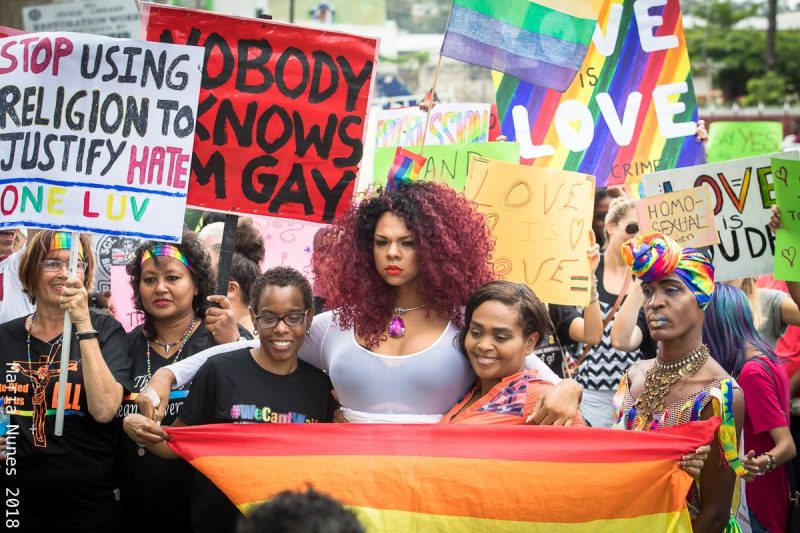
Claimant Jason Jones outside the Hall of Justice in Port of Spain, Trinidad, after the passing down of the High Court ruling. Photo by Maria Nunes, used with permission.
At 10:00 a.m. on Thursday April 12, 2018, Justice Devindra Rampersad entered High Court POS 09 at the Hall of Justice in downtown Port of Spain to deliver his ruling in the case of Jason Jones vs. the Attorney General of Trinidad and Tobago.
The question that hung in the balance was whether the state has the constitutional authority to criminalise sexual relations between consenting adults of the same gender — an act deemed criminal by Sections 13 and 16 of the country's Sexual Offences Act Chapter 11:28.
Inside the courtroom were the claimant, Jason Jones, the defendant and their legal teams, and representatives from interested parties that included the Equal Opportunity Commission, the Sanatan Dharma Maha Sabha (a local conservative Hindu organisation), and the Trinidad and Tobago Council of Evangelical Churches. There were also journalists, supporters of the LBGT+ rights cause, and a handful of religious leaders.
Outside the courtroom, on the steps of the Hall of Justice and in Woodford Square just opposite, were gathered activists from both sides. Many of them held placards defending human rights and a few waved signs quoting Bible verses.

A cross-section of the placards being displayed at Woodford Square, as activists waited for the High Court decision in the case of Jason Jones vs. the State. Photo by Maria Nunes, used with permission.

Human rights supporters gathered outside the Hall of Justice, April 12, 2018. Photo by Maria Nunes, used with permission.

A security guard observes the goings-on at Woodford Square in Port of Spain. Photo by Maria Nunes, used with permission.
Many of the placards sent a message of love, and spoke of the need to protect the rights of all citizens under the country's constitution.
Other signs turned religious rationales on its head.

Two placards that took jabs at the religious traditionalists. Photo by Maria Nunes, used with permission.
Many LBGT+ activists emphasised that the state had no business being in their bedrooms. The movement's hashtag, #JusticeDiversityTT, was also on display, as people advocated for acceptance of diversity within the family unit.

Supporters of the repeal of the buggery law want the state out of matters that are private. Photo by Maria Nunes, used with permission.

A protestor outside Trinidad and Tobago's Hall of Justice in Port of Spain, on April 12, 2018. Photo by Maria Nunes, used with permission.
After his half-hour-long summary of the judgement, Judge Rampersad declared that the court had found Sections 13 and 16 of the Act “unconstitutional, illegal, null, void, invalid and are of no effect to the extent that these laws criminalise any acts constituting consensual sexual conduct between adults”.
Those in court were composed and circumspect. But once the news reached the outside, there was, for the most part, joyful celebration.

The elated crowd on the steps of the Hall of Justice as they got news of the decision. Photo by Maria Nunes, used with permission.

Supporters of the repeal of the “buggery” clause in the Sexual Offences Act are all smiles over the High Court judgement. Photo by Maria Nunes, used with permission.
Quite hearteningly, both before and after the judgement was announced, people with differing opinions stood around talking about the issue — calmly, rationally and respectfully. There was a lot of discussion about consent (many people have the erroneous perception that all anal sex is equal to rape) and the need to recognise each individual's humanity.

An LGBT+ rights supporter has a discussion with a member of a religious group after the court's decision was announced outside the Hall of Justice. Photo by author.
In the end, whether or not the court's ruling managed to change anyone's mind, LBGT+ and religious activists stood side by side on the steps of the Hall of Justice — and in the the words of Trinidad and Tobago's national anthem, found a space where a landmark court ruling made every citizen finally have a more equal place.
Government has already stated that they will appeal the ruling.
















